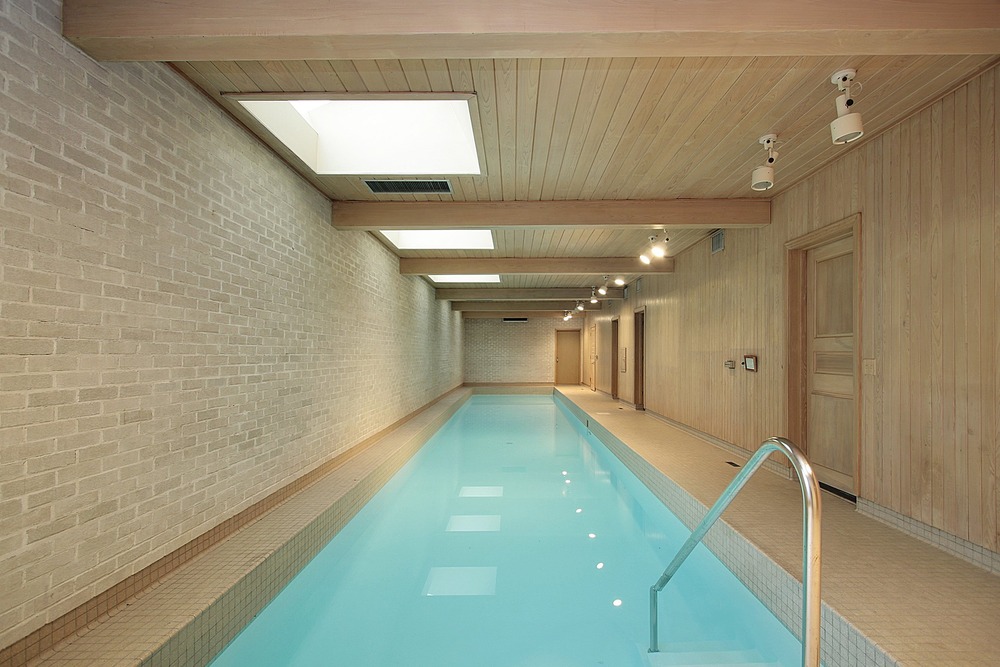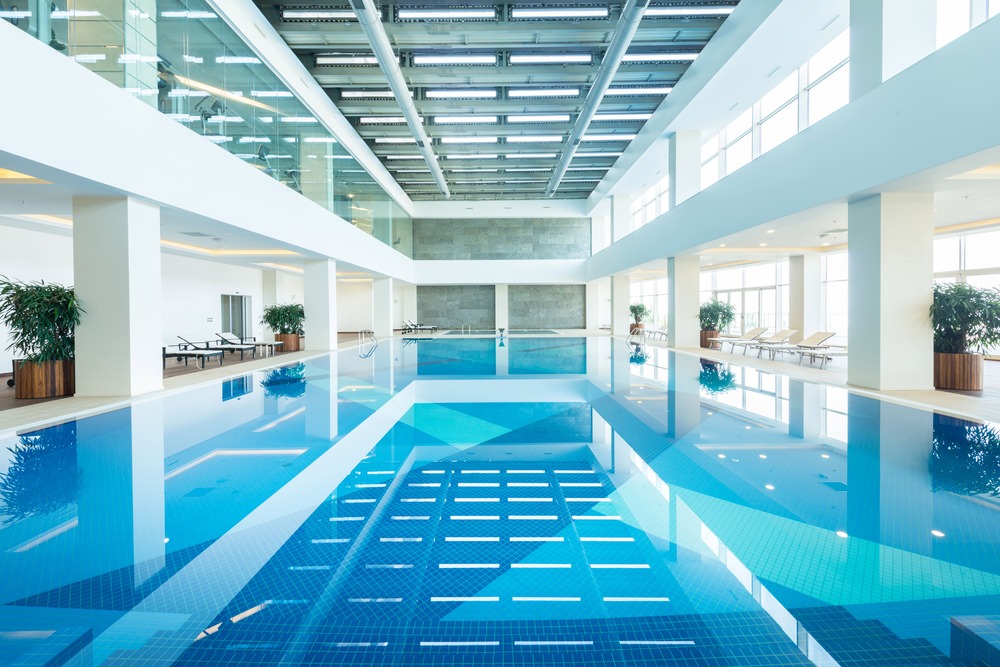Heat pump pool heaters stand at the heart of any successful aquatic installation. After all, swimming pools offer relaxation, recreation, and exercise, but only under the condition of maintaining comfortable water temperatures.
But the benefits of adequate pool heating go beyond that, as it allows for extending the swimming season, ensuring that the water remains warm even during cooler months, and thus offering extended business opportunities.
However, not all pool heating systems are equal. Today, new approaches to heat pump pool heaters are opening the door to adhere to green construction in aquatic facilities. As a consequence, they offer unparalleled efficiencies in terms of energy and costs, and provide a viable sustainable alternative to traditional heating methods such as gas and electric resistance heaters.
In this context, let’s dive deeper into how heat pump pool heaters work, some of their benefits and how to choose the right equipment for an installation.
Dive deeper with the eBook
Understanding heat pump pool heaters
The main working principle behind heat pump pool heaters is their use of ambient air to heat pool water.
This underlying principle is the reason heat pump pool heaters are praised as an environmentally friendly and efficient option: unlike traditional gas or electric resistance heaters (which generate heat directly), heat pumps extract warmth from the surrounding air and transfer it to the water using a refrigeration cycle. This process requires significantly less energy, reducing the operational costs of heating a pool but also the process’ environmental impact.
The result is heat pump pool heaters have been proven to provide steady and reliable heating, making them ideal for both residential and commercial pools.
Types of heat pump pool heaters
Air/water heat pumps
Air/water heat pumps make it possible to prolong the swimming season by exploiting the heat naturally present in the outside air. They represent a very versatile technology that can adapt to both commercial and residential swimming pools.
In fact, the most advanced equipment in this category is able to recover 80% of the heat from the air to heat. Additionally, some models include inverter features that use aerothermal technology in order to further improve efficiencies, as this feature is able to adjust its speed dynamically, consuming only the necessary energy rather than operating at full power all the time.
Heat exchangers
Heat exchangers are a suitable solution for warming water temperatures of small to medium pools and spas. This option relies on generating a heat exchange between the primary circuit (a warm area where heat is extracted) and a secondary one (the cold area that must be warmed). If connected to a boiler, heat exchangers can provide heating all year round. Additionally, some models are compatible with salt water treatment models, which offer added benefits.
Electric heaters
Electric heaters employ the Joule effect as the basis for pool heating. This principle manages to convert electrical energy into heat by means of an electric current passing through a resistant element that generates heat.
Electric heaters are considered outstandingly reliable and efficient and are the right choice for year-round heating in installations where there are space limitations and operators looking for a simple solution that goes unnoticed in spas and small pools. Additionally, some models are compatible with salt water treatment.

Main features of efficient heat pump pool heaters
1. Energy efficiency
One of the primary benefits of heat pump pool heaters is their energy efficiency. This advantage is based on their working principle: because they extract heat from the air rather than generating it, they require significantly less electricity. This, in turn, translates to lower energy bills and reduced carbon footprint.
2. Cost savings
Although the upfront cost of a heat pump pool heater may be higher than that of a gas heater, the long-term savings in energy costs turn it into a more cost-effective investment. With proper maintenance, heat pump heaters can last 10-15 years, offering excellent value over time.
3. Environmentally friendly
Unlike gas heaters that burn fossil fuels, heat pump pool heaters employ electricity and ambient air as a basis, thus producing minimal carbon emissions. This makes them an eco-friendly heating choice that reduces greenhouse gas emissions and promotes sustainability, moving toward the “positive pools” trend.
4. Consistent and reliable heating
While other options for sustainable heating such as solar heaters depend on intermittent energy sources (in this case, sunlight), heat pumps provide consistent heating regardless of weather conditions. As a result, they are able to maintain steady water temperatures and thus ensure an enjoyable swimming experience.
5. Quiet operation
Modern heat pumps are designed with advanced noise-reduction features, making them quieter than traditional pool heaters. This ensures a pleasant poolside environment without disruptive noise from the heating system.
Choosing the right heat pump pool heater for you
Selecting a heat pump pool heater represents a crucial choice for accessing all the benefits outlined above. In this decision, the following are some of the key factors that should be considered:
- Pool size: as a general rule, larger pools require higher-capacity heat pumps to maintain desired water temperatures.
- Climate: heat pumps perform best in regions with mild to warm climates. If you live in an area with fluctuating temperatures, hybrid heat pump models may be the best option.
- Energy efficiency ratings: operators should look for heat pump models with high Coefficient of Performance (COP) ratings, which indicate better energy efficiency.

Top maintenance needs for heat pump pool heaters
Regular maintenance represents a crucial aspect of ensuring heat pump pool heaters reach an optimal performance, while also extending the equipment’s lifespan. The following are the top 4 factors that should inform any maintenance program for heat pump pool heaters:
- Cleaning air filters: removing debris and dirt from air filters is key for maintaining proper airflow.
- Heat exchanger inspection: this involves regular checks for corrosion or scale buildup, especially in saltwater pools.
- Checking refrigerant levels: periodic inspections are recommended as low refrigerant levels can impact performance.
- Monitor water flow: adequate water flow must be guaranteed to prevent overheating or system malfunctions.
Heat pump pool heaters: the solution for year-round efficient and sustainable warmth
As seen across the article, heat pump pool heaters stand out as an efficient, eco-friendly, and cost-effective solution for maintaining comfortable pool temperatures year-round.
With their capacity to provide consistent heating, reduce energy costs, and minimize environmental impact, this piece of equipment has proven to be an excellent choice for both residential and commercial pools.
When it comes to picking the right heat pump pool heater, a golden rule applies: whether you’re looking for a budget-friendly option or a high-end smart heat pump, investing in a quality heat pump pool heater ensures years of swimming comfort.
By choosing the right heat pump and maintaining it properly, pool owners can enjoy warm water and extended swim seasons while saving on energy costs.
Fluidra’s extensive options for heat pumps offer a wide-range of technologies suitable for pool heating. Combined with our expert guidance on designing efficient, sustainable aquatic facilities, they offer the opportunity to elevate any pool installation.
